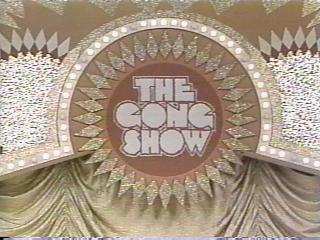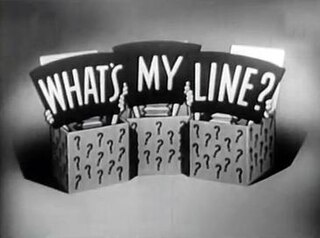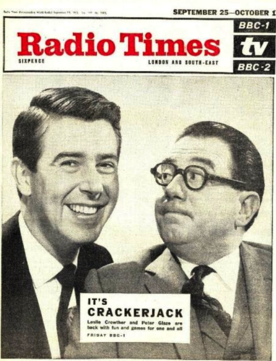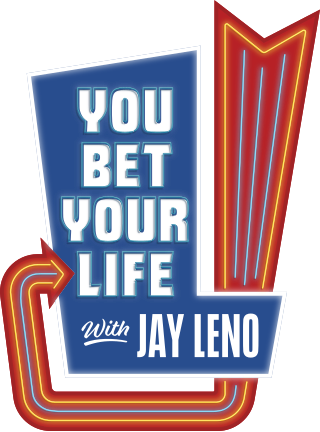
Hollywood Squares is an American game show in which two contestants compete in a game of tic-tac-toe to win cash and prizes. The show piloted on NBC in 1965 and the regular series debuted in 1966 on the same network. The board for the game is a 3 × 3 vertical stack of open-faced cubes, each occupied by a celebrity seated at a desk and facing the contestants. The stars are asked questions by the host and the contestants judge the truth of their answers to gain squares in the right pattern to win the game.

Match Game is an American television panel game show that premiered on NBC in 1962 and has been revived several times over the course of the last six decades. The game features contestants trying to match answers given by celebrity panelists to fill-in-the-blank questions. Beginning with the CBS run of the 1970s, the questions are often formed as humorous double entendres.

The Gong Show is an American amateur talent contest franchised by Sony Pictures Television to many countries. It was broadcast on NBC's daytime schedule from June 14, 1976, through July 21, 1978, and in first-run syndication from 1976 to 1980 and 1988 to 1989, and was revived in 2017 for broadcast on ABC. The show was created and originally produced by Chuck Barris, who also served as host for the NBC run and from 1977 to 1980 in syndication. Its most recent version was executive-produced by Will Arnett and hosted by Tommy Maitland, a fictional character performed by Mike Myers. The Gong Show is known for its absurdist humor and style, with the actual competition secondary to the often outlandish acts presented; a small cash prize has typically been awarded to each show's winner.

Donald James Yarmy, known professionally as Don Adams, was an American actor and stand-up comedian. In his five decades on television, he was best known as bumbling Maxwell Smart in the television situation comedy Get Smart, which he also sometimes directed and wrote. Adams won three consecutive Emmy Awards for his performance in the series (1967–1969). Adams also provided the voices for the animated series Tennessee Tuxedo and His Tales (1963–1966) and Inspector Gadget (1983–1986) as well as several revivals and spinoffs of the latter in the 1990s.

Remote Control is an American TV game show that ran on MTV for five seasons from 1987 until 1990. It was MTV's first original non-musical program and first game show. A concurrent syndicated version of the series ran during the 1989–1990 season and was distributed by Viacom. Three contestants answered trivia questions on movies, music, and television, many of which were presented in skit format.

What's My Line? is a panel game show that originally ran in the United States, between 1950 and 1967, on CBS. The game show started in black and white and later in color, with subsequent U.S. revivals. The game uses celebrity panelists to question contestants in order to determine their occupation. The majority of the contestants were from the general public, but there was one weekly celebrity "mystery guest" for whom the panelists were blindfolded. It is on the list of longest-running U.S. primetime network television game-shows. Originally moderated by John Charles Daly and most frequently with regular panelists Dorothy Kilgallen, Arlene Francis, and Bennett Cerf, What's My Line? won three Emmy Awards for "Best Quiz or Audience Participation Show" in 1952, 1953, and 1958 and the Golden Globe Awards for Best TV Show in 1962.

Howard Michael Mandel is a Canadian comedian, television personality, actor, and producer. Mandel is known for voicing Gizmo in the 1984 film Gremlins and the 1990 sequel Gremlins 2: The New Batch, playing rowdy ER resident Dr. Wayne Fiscus on the NBC medical drama St. Elsewhere, and creating and starring in the Fox children's cartoon Bobby's World. He has also been a judge on NBC's America's Got Talent since 2010, and Citytv's Canada's Got Talent since 2022. He hosted the American NBC and later CNBC game show Deal or No Deal, as well as the show's daytime and Canadian-English counterparts.

Hey Hey It's Saturday was a long-running variety television program on Australian television. It initially ran for 28 years on the Nine Network from 9 October 1971 to 20 November 1999, with a recess in 1978. Its host throughout its entire run was Daryl Somers, who later also became executive producer of the program. The original producer, Gavan Disney, left the program in December 1990 and Somers then formed a production company, Somers Carroll Productions, with comedy writer and on-screen partner Ernie Carroll, the performer of Somers' pink ostrich puppet sidekick Ossie Ostrich. Carroll retired in 1994, and Ossie was no longer featured in the show.

Crackerjack is a British children's television series which was initially aired on the BBC Television Service between 14 September 1955 and 21 December 1984. The series was a variety show featuring comedy sketches, singers and quizzes, broadcast live with an audience.

I've Got a Secret was an American panel game show produced by Mark Goodson and Bill Todman for CBS television. Created by comedy writers Allan Sherman and Howard Merrill, it was a derivative of Goodson–Todman's own panel show, What's My Line?. Instead of celebrity panelists trying to determine a contestant's occupation, however, as in What's My Line, the panel tried to determine a contestant's secret: something that is unusual, amazing, embarrassing, or humorous about that person.

You Bet Your Life is an American comedy quiz series that has aired on both radio and television. The original version was hosted by Groucho Marx of the Marx Brothers, with announcer and sidekick George Fenneman. The show debuted on ABC Radio on October 27, 1947, moved to CBS Radio debuting October 5, 1949, and went to NBC-TV and NBC Radio on October 4, 1950. Because of its simple format, it was possible to broadcast the show on both radio and television but not simultaneously. Many of the laughs on the television show were evoked by Groucho's facial reactions and other visual gimmicks. So the two versions were slightly different. The last episode in a radio format aired on June 10, 1960. The series continued on television for another year, recording the last season, beginning on September 22, 1960, with a new title, The Groucho Show.

The Sunday Night Project is a British comedy-variety show by Princess Productions that first aired on Channel 4 in February 2005 under the title The Friday Night Project. Originally broadcast on Friday nights, the show moved to Sunday nights for its seventh series in 2008.

Drew Carey's Green Screen Show is an American improvisational comedy television series that aired in the fall of 2004 on The WB, and the fall of 2005 on Comedy Central. The show was hosted by Drew Carey, and was somewhat a follow-up to the show he formerly hosted, Whose Line Is It Anyway?. The distinguishing feature of the show was that the improv games were performed in front of a "green screen", with animation, music and sound effects inserted in post-production. The show was otherwise very similar to Whose Line? and featured many of the same performers and games.

Who Wants to Be a Millionaire is an American television game show based on the format of the same-titled British program created by David Briggs, Steven Knight and Mike Whitehill and developed in the United States by Michael Davies. The show features a quiz competition with contestants attempting to win a top prize of $1,000,000 by answering a series of multiple-choice questions, usually of increasing difficulty. The program has endured as one of the longest-running and most successful international variants in the Who Wants to Be a Millionaire? franchise.

The Price Is Right is an American game show produced by Mark Goodson-Bill Todman Productions, wherein contestants placed successive bids on merchandise prizes with the goal of bidding closest to each prize's actual retail price without surpassing it. The show was a precursor to the current and best-known version of the program, which premiered in 1972 on CBS's daytime schedule. It makes The Price Is Right one of only a few game show franchises to have aired in some form across all three of the Big Three television networks.

Showoffs is an American television game show which ran on ABC from June 30 to December 26, 1975. Bobby Van was host, with Gene Wood as announcer. The Mark Goodson-Bill Todman production involved two teams competing in a game of charades.

The Face Is Familiar is an American game show which aired in color on CBS as a summer replacement show from May 7 to September 3, 1966. The show was hosted by Jack Whitaker and featured celebrity guests including Bob Crane, Dick Van Patten, Mel Brooks and June Lockhart.

Whose Line Is It Anyway? is an American improvisational comedy television series, and is an adaptation of the British series of the same name. It originally aired on ABC and ABC Family from August 5, 1998 to December 15, 2007, hosted by Drew Carey. A revival of the show, hosted by Aisha Tyler, began airing on The CW on July 16, 2013.

Ask Me Another is an hour-long radio puzzle game show that was produced by WNYC and National Public Radio. It was hosted by Canadian American comedian Ophira Eisenberg and featured as its "in-house musician" or "one-man house band" independent rock musician Jonathan Coulton. Episodes of the show were usually recorded at The Bell House in Brooklyn, New York, however the show did go to various states across the country and recorded one or more episodes from those locations. The show was produced by WNYC Studios. During the COVID-19 pandemic in the United States, the show continued taping episodes from the homes of the participants, without a studio audience.

Mask Singer is a French reality television series based on the format of the South Korean television game show series King of Mask Singer by Munhwa Broadcasting Corporation. Run by TF1 Group, Mask Singer is a singing competition between celebrities donning elaborate costumes and face coverings to conceal their identity from the audience, judges and other contestants.




















